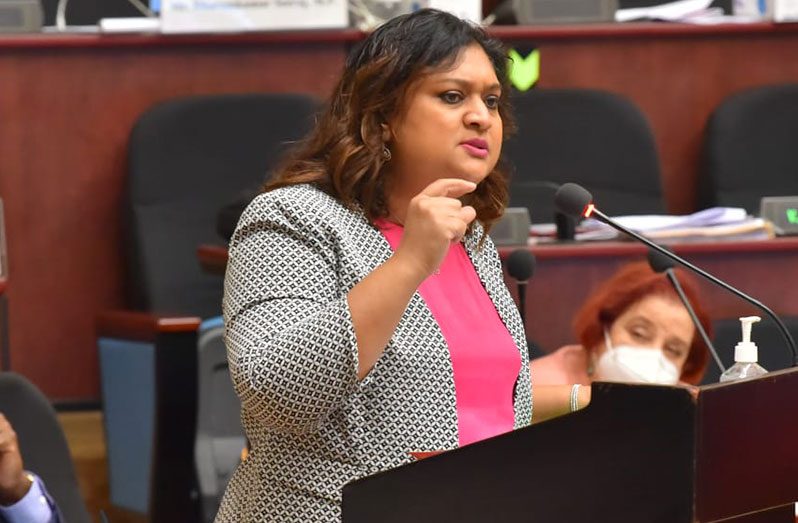–Minister Manickchand argues, outlines plethora of measures in Budget 2022 to enhance education sector
THE cost of closing schools amidst the COVID-19 pandemic outweighs the risk of keeping them opening, Minister of Education, Priya Manickchand, has contended in her defense of the government’s fiscal plan, which includes measures to continue the local recovery of the education sector from learning losses suffered over the past two years.
In a passionate presentation to the National Assembly on Wednesday, Minister Manickchand affirmed her support for Budget 2022, and outlined the wide range of initiatives that will be rolled out to enhance and improve the education sector.
“Real data confirms that students have incurred substantial learning loss. We cannot afford to lose this generation of kids, our future depends on it. The cost of closing schools outweighs the risks of keeping schools open.
“Our reopening is very consistent with how the world behaved during the pandemic. We had to be resolute, close our minds to the noise [from opposition members] and do what was best for our children. We are heading towards the 100th week of education disruption around the world. School children have lost an estimated two trillion hours and counting of in-person learning,” Minister Manickchand posited.
She said that Guyana has already begun to feel some of the effects of the massive learning loss, which is evident in the rate of school dropouts and even some female students becoming pregnant.
To cushion the effects of the pandemic on learners and even households, the ministry plans to increase the education grants from $19,000 to $30,000, present a 30-seater bus to the regional administration in Region Seven and expand the school feeding programme, which is ongoing in 902 schools across the country, among other things.
Minister Manickchand related that this forms part of her ministry’s strategic recovery plan.
The minister who took over as Minister of Education from now Opposition Parliamentarian Nicolette Henry, in August 2020, reminded that when Henry closed schools in March 2020, learners and teachers went for months without structured guidance on a way forward.
“When [Henry] stands there and says she wants a plan, the plan has been defined and outlined in many documents. It was under her ministry, the first time the country went without a published education sector plan. We published it last year, five years after you couldn’t do it,” Manickchand said.
Manickchand defended the worth of the $30,000 grant and other measures, which outweigh the former government’s “David G 5Bs” programme. The coalition had used the 5Bs programme to defend its cancelation of the Because We Care cash grant initiative in 2015.
However, Minister Manickchand revealed that when she assumed office, a lot of the initiatives under the 5Bs programme, particularly the provision of transportation, were only available to a few learners and did not benefit majority of the almost 200,000 persons in the public school system. This, she argued, pales in contrast to the “Because We Care” cash grant and uniform vouchers, which will be going to each learner.
She also reminded that the former APNU+AFC government had maintained that it did not have enough money to fund the “Because We Care” cash grant, although the Education Ministry, in 2017, returned $2 billion to the National Treasury.
“That $2B could’ve done that cash grant and more,” Manickchand said.
Henry, in her address, called for the creation of a “Human Capital Scheme” and for emphasis to be placed on learners with special education needs and Technical and Vocational Education Training (TVET). Those areas are, however, all catered for in Budget 2022.
Over $3.6 billion has been budgeted for the development of various areas in TVET, while measures for learners with special education needs include the creation of a national autistic classroom. Further, the Education Ministry has over 2,200 teachers who are trained to provide appropriate instructions to such learners.
Manickchand also set the opposition straight on their call for citizens to not be given scholarships unless they are tied to working back in the public service.
“The barefacedness of it is that the APNU+AFC will come here having awarded themselves scholarships and not serving in the public sector, but saying unless people can serve back they shouldn’t get the scholarship,” she said.



.jpg)








